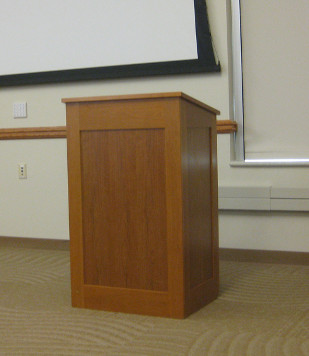
One issue that is unfortunately contentious these days is whether denying Nazis a platform to organize and recruit by banning them from online spaces and university campuses (hereafter “No Platform”) is a violation of free speech principles. I say “unfortunately”, because it is hard to believe that we are actually having this discussion: of course it is not a violation of free speech principles to prevent evil people from organizing to commit genocide. But even if it were, we would still be morally obligated to so prevent them.
That said, there are quite a few arguments widely given for why a commitment to free speech in general is not inconsistent with No Platform. Some are linked below. But this is one that I hope is novel. It is probably more weird than convincing, but I don’t mind.
Last week, I was at a memorial for the Charleston 9, and was reminded that one of the victims was Charleston librarian Cynthia Hurd. And it occurred to me that in a deep way, that a murderer is the direct antithesis of a librarian.
Everyone who lives is a unique, irreplaceable repository of infinitely particular knowledge. No matter who they are, they are recording their histories in their memories, in their bodies, and in their relationships. It is a horror for this information to be lost for any reason, a horror for anyone to die. But much more so when they are murdered. Someone is intentionally destroying this history, erasing this knowledge, these relationships.
A librarian is a preservationist. By preserving books, papers, recordings, they keep some small part of some few people’s lived knowledge alive after their deaths. It is so little compared to what is lost, but so much more than we would have without them.
A librarian is the opposite of a murderer.
A fascist, a Klansman, a Nazi, is a murderer. He may not have murdered anyone himself, yet. But all fascists approve of murder to demonstrate the power of the state or the race, to intimidate their supposed enemies, and to rid the world of those they consider less than human. Fascists believe in destroying information. In the elimination of speech and potential speech.
When fascists argue that freedom of speech means that they should be able to use internet spaces and public spaces to promote themselves, to recruit, and to organize, they simply cannot be taken at face value. Their information contribution is minimal: spamming public spaces with copies of the same repetitive lies, discredited arguments, and atavistic emotional appeals like a memetic equivalent of grey goo. They’re not arguing to establish truth, or even to convince anyone who is thinking for themselves; they’re just putting out lots of copies of the same thing, knowing that it will stick to someone. Someone who can then be groomed to spam more copies of the same thing. And someone who can be groomed to kill.
So clearly, the information value of Nazi speech is negative. They are calling for the destruction of an irreplaceable resource, and to the extent they contribute anything, it is low-value and redundant. If we want to maximize freedom of speech, if we want to optimize for the accumulation of knowledge, if we want, in the end, to support human values, we must say “No Platform” to Nazis and fascists. In the interest of freedom of speech, we must be librarians, and we must silence fascists.
Some links on No Platform
- Why “No Platform” is still relevant, and the problem with liberal “anti-fascism”
- Free Speech and No Platform: a brief libertarian case for silencing fascists
- No-Platforming is not censorship
Comments
This blog doesn’t support comments, but you can comment on the fediverse. Please comment on this thread.